By Doron Krakow
A Moment That Lasts a Lifetime
It was tied, 1-1, at the end of overtime, leading to a round of penalty kicks that would decide the gold medal. A final kick would break the tie. The goalie got the call, and with a clean shot to the right corner, it was over. For one team—jubilation. For the other—heartbreak. It had been a terrific contest. Two impressive teams and the crowd on the edge of our seats—when we could stay in them at all.
But the game itself was only part of the story.
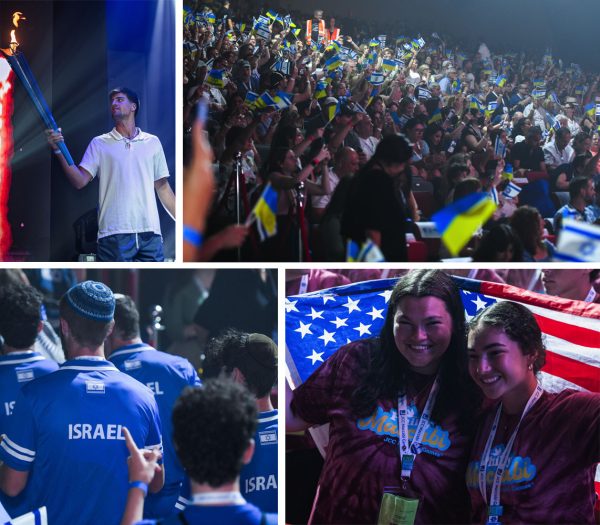
More than a thousand young athletes took part in the JCC Maccabi Games® in Israel this week. Most were part of JCC delegations from across North America, joined by teams from eight other countries, including over 250 Israelis. A highlight of the powerful opening ceremony on Sunday evening in Haifa was the arrival of the 10 members of Team Ukraine. With help from an array of supporters and partners, they managed to travel from half a dozen cities—cities devastated by the ongoing war—to be part of these Games, and with blue and gold flags flying throughout the arena, they brought the packed crowd to its feet and brought tears to its eyes.

History, too, was made. For the first time at a sporting event in Israel, the flag of Morocco was carried aloft by the Games’ inaugural delegation from an Abraham Accords country. Until this week, Moroccan athletes at any sporting event in Israel had only ever played under the flag of France. Until this week.
Focused largely on team sports, the competitive divisions of the JCC Maccabi Games are determined by age and gender, and just over 50% of the teams are exclusive to a single JCC community. The remainder are combinations of communities. Those who arrived as full teams had the advantage of preparation, while the mixed teams had little time to develop team chemistry or game plans, much less get to know one another before the action began. But that didn’t stop anyone.
That brings me back to the U17 (under 17 year old) boys soccer championship game. The winning coach, Jesse Golman, had no idea he’d be in Israel this summer. A late scratch by another coach created an urgent need, and when Jesse got the call, he stepped up and cleared his calendar. He coaches the Division 1 women’s soccer team at the University of Pittsburgh, and, oh yeah, he’s a former JCC Maccabi soccer player (2011 in Baltimore), a former delegation head, and a former staff member of the JCC of Greater Pittsburgh.
Jesse met his team exactly seven days ago, a mixed team, cobbled together from JCCs in the D.C. area, Indianapolis, Long Beach, and Miami, along with two players from Morocco, one from Ukraine, and a goalie from Israel. No common language. Almost no prior connections. They had little more than an hour of practice before the tournament began, but after an early, lopsided defeat, it started to come together. Only a few days later, all eyes were on the two goalies—the one taking that final penalty kick and the one trying with every fiber of his being to stop it.
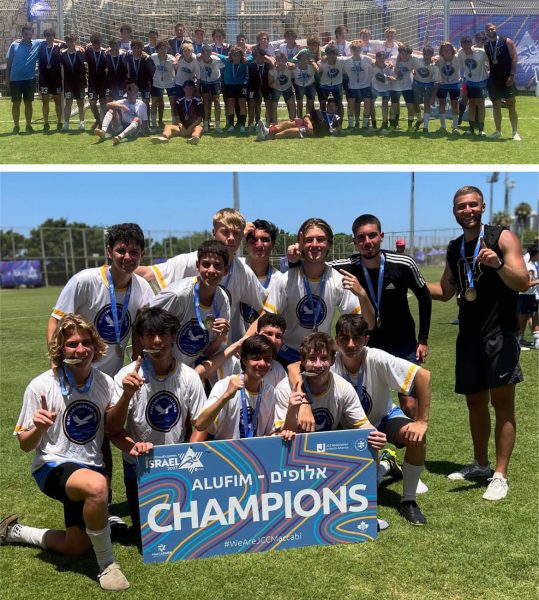
I stood on the sidelines, watching, cheering, and reveling in what I’d witnessed. It looked like the moments that follow the last out in the World Series. The winning team exploded in joy. These kids who’d been strangers were now champions. And they’d found their voice, their common language, in Amiyut Yehudit | תיהודי עמיות | Jewish peoplehood. And their coach? Of course he’d been part of countless big moments before, but as he gathered his team in a group embrace and shared his pride, his joy, and his gratitude for the birthday gift they’d given him, he told them, “It was the greatest victory of my life!”
This team. This game. This moment. It was just one of hundreds that unfolded over the last eight days of competition, service, education, of amiyut—shared by 1,100 kids and hundreds of coaches, staff, volunteers, and parents. There were far too many special moments to mention, but a few more are in order.
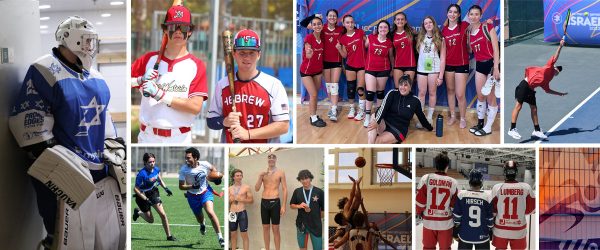
Israel’s extraordinary president, Isaac Herzog, addressed the opening ceremony almost exactly one year after President Biden addressed the U.S. delegation to the Maccabiah—the quadrennial Jewish Olympic Games—at its opening ceremonies in Jerusalem.
Throughout the week, our JCC Maccabi athletes participated in clinics and showcases with Israeli Olympic champions, creating moments they’ll be talking about with their children and grandchildren.
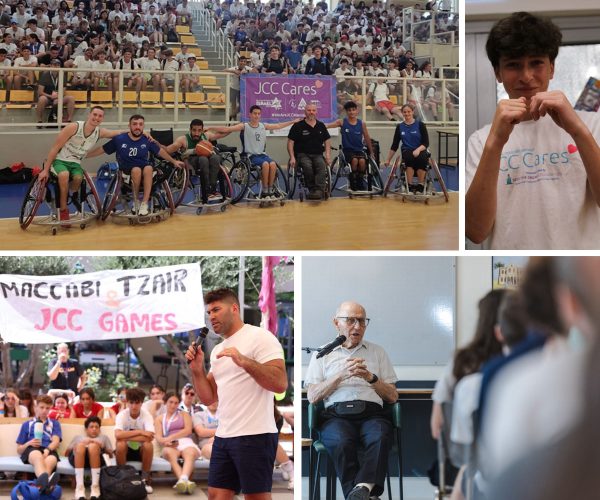
Every athlete took part in a JCares service program. One of them took place at the Israel ParaSports Center—among the world’s foremost institutions for disabled athletes—and featured Israeli Paralympic champions who put on a wheelchair basketball demonstration and workshop.
 The closing ceremonies were hosted by Maccabi Tzair—the youth movement of our partner, Maccabi World Union, the producer of the Games in Israel—in a forested campsite on the outskirts of Pardes Hanna. Nine hundred Israeli teens welcomed our kids to their place—and what began as an hour of carefully planned activities led to a picnic dinner, a video recap of the week gone by, and the passing of the torch to next year’s host communities. A final, wistful moment of thanks gave way to a joyful eruption of dancing and revelry and music that continued well into the night. Delegation tee-shirts were exchanged throughout the evening, and what had once been a collection of recognizably distinct groups became a community of 2,000 faces of every color and identity that together formed a magnificent mosaic of the Jewish people.
The closing ceremonies were hosted by Maccabi Tzair—the youth movement of our partner, Maccabi World Union, the producer of the Games in Israel—in a forested campsite on the outskirts of Pardes Hanna. Nine hundred Israeli teens welcomed our kids to their place—and what began as an hour of carefully planned activities led to a picnic dinner, a video recap of the week gone by, and the passing of the torch to next year’s host communities. A final, wistful moment of thanks gave way to a joyful eruption of dancing and revelry and music that continued well into the night. Delegation tee-shirts were exchanged throughout the evening, and what had once been a collection of recognizably distinct groups became a community of 2,000 faces of every color and identity that together formed a magnificent mosaic of the Jewish people.
For our kids, the end of these Games marks the beginning of two weeks of travel and touring, as the Israel@75 celebration continues. Before the month is out, they’ll head home to Montreal and Miami, Dallas and Dnipro, Katamon and Kansas City, Kishinev and Colorado, Brooklyn and Bat Yam. They started their adventure as members of local teams, but they will return home as Jewish athletes who are part of something so much bigger, ready for what comes next.
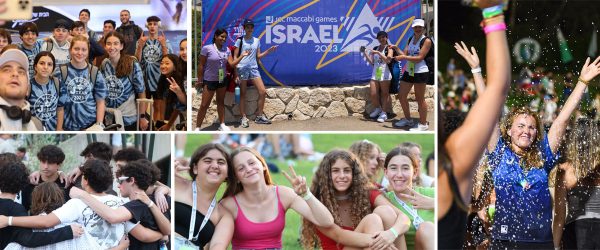
These Games are over, but the clock ticks on as we count down the days until the August 6th opening ceremony of the JCC Maccabi Games® and Access in Fort Lauderdale, Florida. Host communities for 2024 will be announced next week, and planning has already begun to bring the Games back to Israel in 2027.
Nearly all the most memorable moments in our lives seem to occur when we least expect them, but once in a while, we have the chance to make those moments. That’s what happened here in Israel this week—not only for the kids but for everyone who had a hand in making these Games possible. My cup overflows.
Am Yisrael Chai | עם ישראל חי
Shabbat Shalom | שבת שלום

Doron Krakow
President and CEO
JCC Association of North America

Seventy-five years ago this week, the nascent Israel Defense Forces undertook a fourth and final attempt to capture the former British police station at Latrun, which had been conquered in the early days of the War of Independence by the Jordanian Legion, under the command of British officers. Latrun had a chokehold on the main road to Jerusalem, cutting off supplies to the isolated Jewish community there. Like the previous three, this attack ended in failure, resulting in the deaths of 23 Israeli soldiers and dozens more wounded. Latrun would remain under Jordanian control until 1967, when Israel retook it in the Six-Day War.
And that’s the way it was…
JCC Maccabi continues. Follow the journey of our JCC Maccabi athletes as they tour Israel. Follow us @jccmaccabi on Instagram and @jccmaccabigames on Facebook.
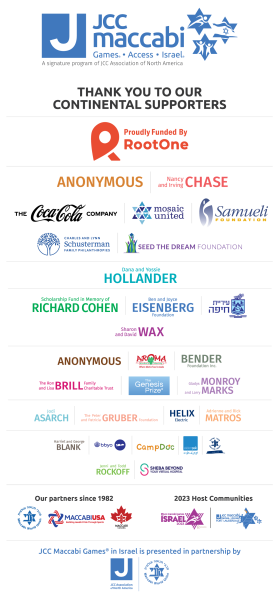
Reader Interactions